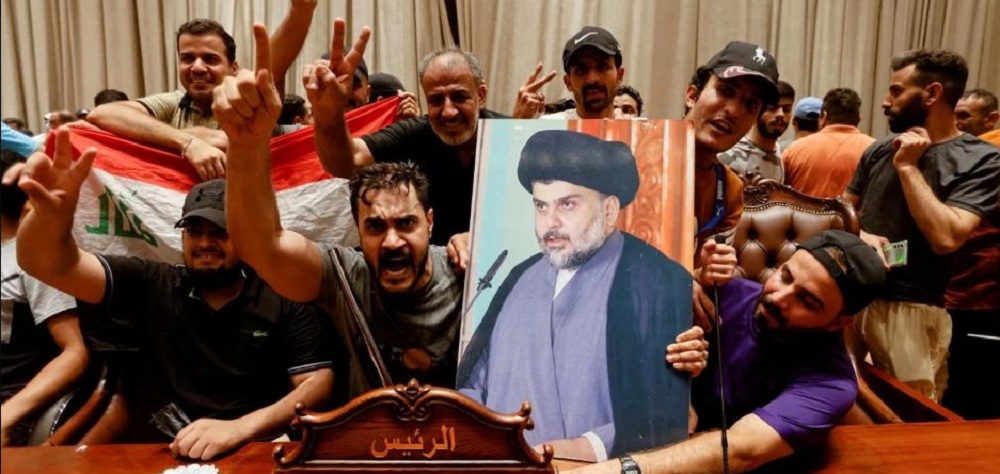Alwaght- While Iraqi political factions led by Shiite Coordination Framework (SCF) took a step forward after months to end the stalemate and form a new government by naming Mohammed Shia al-Sudani for the prime minister post, storming the parliament building by Muqtada al-Sadr supporters and seizing it in recent days showed that the country is far from a solution to current crisis and not only there are serious obstacles to cabinet formation but also conditions could spiral into a deeper crisis. Fear of grave scenarios makes calls for dialogue a common emphasis of a majority of the actors, particularly the SCF.
Reacting to the seizure of the parliament by al-Sadr supporters, the head of National Wisdom Movement Sayyed Ammar al-Hakim in Saturday evening stressed that the situation in Iraq invites for domination of "the language of logic, wisdom, and dialogue."
Al-Maalomah news website, quoting al-Hakim, reported that the National Wisdom Movement is calling for direct Sadrist Movement and the SCF talks.
Shafaq News, citing one of the leaders of the SCF, reported that the bloc is trying to establish channels for dialogue with al-Sadr, because the relations between the two sides have become badly strained and this risks armed clashes between supporters of the two sides. He continued that the SCF is working on a mechanism for direct talks with prominent Sadrist leaders to work out political initiatives to contain the current crisis. Meeting with al-Sadr is also part of the efforts, he continued, speaking on the condition of anonymity.
Al-Hakim, Fatah bloc's leader Hadi al-Amiri, and Nasr bloc's leader Haider al-Abadi are leading these efforts, he went on.
Also, Nechirvan Barzani, the president of Kurdistan Regional Government (KRG) and nephew of the leader of Kurdistan Democratic Party (KDP) Masoud Barzani who was an ally to al-Sadr before the latter walked out of the political process, voiced concerns about endangerment of peace and stability in the country and called for self-restraint and start of direct talks to settle the differences.
Iraqis and the need to abandon lose-lose game
A look at the post-election conditions that caused al-Sadr and Sadrist Movement lawmakers' walkout from the parliament reveals the impossibility of ignoring the decisive power of the SCF. With its heavy parliamentary weight and powerful social body, the Coordination Framework even managed to move towards electing president and naming a prime minister by taking principal, democratic, and compromising stances that helped absorb the independents into its body. These arrangements shattered al-Sadr's calculations that by a suicidal resignation he can lead the country to a snap election.
The SCF, again clinging to its principal approach of past months, is taking steps towards negotiations to deal with the political troubles caused by the Sadrists in recent days. The bloc knows that an alternative to dialogue is a lose-lose game in stark contrast to the collective interests of the Iraqis. In fact, the request for negotiation is not because of weakness and fear of failure in the political struggle but because of adoption of a wise agenda and foresight to avoid fueling the crisis and taking the power at any cost.
Firstly, with the absence of dialogue the current several-month deadlock will certainly continue in the next months and this leads to dangerous trend of short-living, shaky cabinets that have been overshadowing the country's politics since 2019 and rendering people cynical about a majority of the political parties and generally the efficiency of the political system. Leaving the popular problems unsolved amid political competitions damages public trust in the very political structure and disappoints people about possibility of improvement of the situation in the future. Any right mind should understand the preferablity of finding a national solution over party interests.
Secondly, reciprocal measures and continuation of street fighting will only weaken the democratic processes and discredit the elections in the future. Provoking the supporters as a game card in a power struggle is a dangerous action that risks social and political unrest and destruction of political processes as legal channels determining the fate of political completions, and this, indeed, does not serve national stability.
Thirdly, isolating the negotiation option and embracing reciprocation definitely provides the enemies with chances to fuel unrest and riots. The Iraqis are already familiar with foreign-hatched plots —mainly ISIS terrorist organization plot— and cannot be tested again.
And fourthly, weakening the national unity is one of the irreparable damages of the political limbo and avoiding it requires all groups that care about Iraqi national interests to shoulder their responsibility.



























